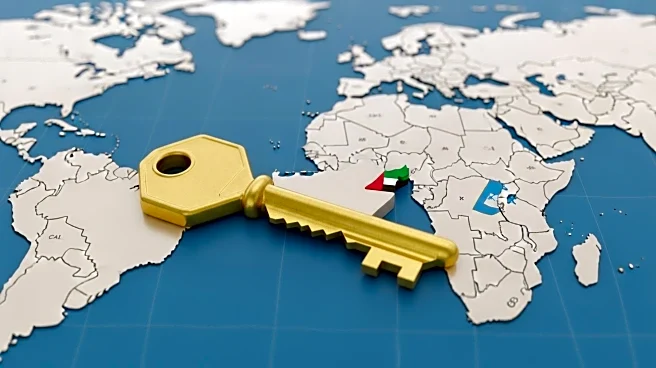What's Happening?
The United Arab Emirates (UAE) issued a public warning to Israel regarding its plans to annex parts of the West Bank, which could severely damage the Abraham Accords. This warning, described as unprecedented by Israeli officials, has led Prime Minister Benjamin Netanyahu to reconsider his approach to the annexation issue. The UAE's Assistant Minister for Political Affairs, Lana Nusseibeh, emphasized that annexation would be a red line for Abu Dhabi. The warning followed a series of private messages from the UAE to Israel, expressing frustration over Netanyahu's lack of response. The UAE's statement appears to have influenced Israel's decision to remove the annexation issue from a scheduled discussion agenda, opting instead for a general situational assessment of the West Bank.
Why It's Important?
The UAE's warning highlights the potential diplomatic fallout that could arise from Israel's annexation plans. The Abraham Accords, which normalized relations between Israel and the UAE, are at risk of being undermined, affecting regional stability and cooperation. The situation also reflects the complex dynamics between Israel, the UAE, and the United States, with the latter's quiet backing of Israel's actions potentially straining relations with the current U.S. administration. The warning underscores the broader international criticism Israel faces over its West Bank policies, which could impact its diplomatic standing and economic ties in the region.
What's Next?
The future of Israel's annexation plans remains uncertain, as domestic pressure from coalition partners continues to push for sovereignty over the West Bank. Finance Minister Bezalel Smotrich has advocated for applying Israeli law to a significant portion of the area, emphasizing the need to prevent the establishment of a Palestinian state. The UAE's warning may lead to further diplomatic engagements and negotiations, as both Israel and the United States reassess their positions in light of potential repercussions on the Abraham Accords and regional relations.
Beyond the Headlines
The UAE's intervention reflects broader geopolitical shifts in the Middle East, where traditional alliances are being tested by new diplomatic frameworks like the Abraham Accords. The situation also raises ethical questions about the balance between national sovereignty and international diplomacy, as well as the long-term implications for peace efforts in the region. The evolving dynamics could influence future negotiations and the role of external actors in the Israeli-Palestinian conflict.









